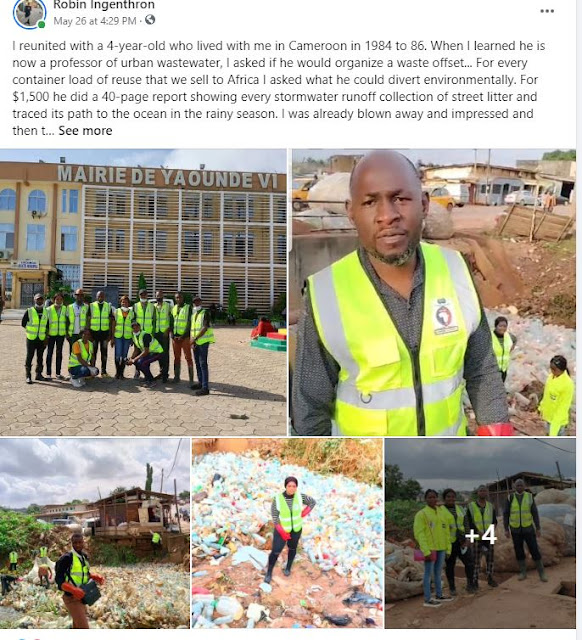A caution about our plastic litter "offset" project in Cameroon...
While we remain proud of the success documented by University of Cameroun researchers, as profiled in Recycling Today, I found out yesterday that we owe several words of caution. For decades, African city canals have suffered pollution and diseases associated with raw sewage.
For published peer reviewed articles on the subject, google our lead researcher, Dr. Asi Quiggle Atud et. al.
- Abundance Dynamic of Oocysts in the Groundwater of Mbankomo, a Sub-urban Area Yaounde: Physico-chemical Factors and Health Risk
- Distribution of Cryptosporidium and Cyclospora in the Soil Around the Wells and Springs in Yaounde and Environs: Role of Some Abiotic Factors of the Medium
- Biomonitoring of drinking water (springs) in the sub-urban areas of Centre Region (Cameroon): Microsporidies and quality of water
So glad we partnered with experts rather than diving in, so to speak, with informal sector workers.
While the "bang for the buck" cost of diverting ocean-bound plastic in early rainy season was strongly demonstrated, four of the workers suffered bacterial illness afterwards.
https://www.ncbi.nlm.nih.gov/pmc/articles/PMC7126130/
https://www.in.gov/health/eph/onsite-sewage-systems-program/diseases-involving-sewage/
The disease risks involving city sewage in emerging markets are one of the reasons we are working with the University of Cameroun, Yaounde, rather than with the so-called "informal sector" in this second stage.
As with #GeeksofColor accused of dumping electronics, we have to recognize that these are Africans taking risks to their personal health to provide a better future for their society. It's another case of the perfect being the enemy of the good, but also a call to constantly improve and leave no environmental soldiers behind.
I was frightened by the news of the hospitalization of Dr. Asi. He is in many ways the splitting image of his father, my landlord from 1984-86 in Ngaoundal, Cameroon. His dad tragically died when Dr. Asi was still a boy. Now I have to #ShareTheScare and document the need for PPE and santization after every exposure to the city water.
The cost effectiveness of the collection and sorting of the different types of plastic is still strongly evidenced as promising more diversion potential in a "litter offset" model. And this program can hardly be described as "offshoring" litter collection in more expensive OECD nations. Or rather, it is "offshoring" in a positive way as compared to picking the plastic off beaches and fishing it out of the oceans post rainy season.
I for one will keep recycling, and keep doing LCA Life Cycle Analysis and working outside my OECD silo. But I had to take this time to "share the scare".







No comments:
Post a Comment